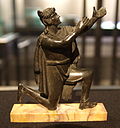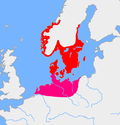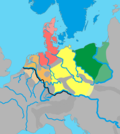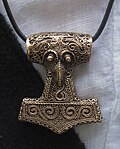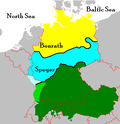Look up Germanic or germanic in Wiktionary, the free dictionary. Germanic may refer to: Germanic peoples, an ethno-linguistic group identified by their...
797 bytes (121 words) - 17:25, 11 December 2021
The Germanic peoples were tribal groups who lived in the north of Europe in Classical Antiquity and the Early Middle Ages. In modern scholarship, they...
164 KB (20,219 words) - 13:52, 18 August 2024
The Germanic languages are a branch of the Indo-European language family spoken natively by a population of about 515 million people mainly in Europe,...
93 KB (9,514 words) - 20:30, 13 August 2024
The West Germanic languages constitute the largest of the three branches of the Germanic family of languages (the others being the North Germanic and the...
56 KB (4,764 words) - 13:17, 18 August 2024
Proto-Germanic eventually developed from pre-Proto-Germanic into three Germanic branches during the fifth century BC to fifth century AD: West Germanic, East...
130 KB (12,136 words) - 12:36, 5 August 2024
Germanic paganism or Germanic religion refers to the traditional, culturally significant religion of the Germanic peoples. With a chronological range...
128 KB (15,973 words) - 18:28, 2 July 2024
The North Germanic languages make up one of the three branches of the Germanic languages—a sub-family of the Indo-European languages—along with the West...
57 KB (5,429 words) - 00:05, 27 July 2024
Indo-European languages (redirect from Indo-Germanic)
languages still alive today: Albanian, Armenian, Balto-Slavic, Celtic, Germanic, Hellenic, Indo-Iranian, and Italic; another nine subdivisions are now...
112 KB (10,231 words) - 17:29, 17 August 2024
English language (category Germanic languages)
English is a West Germanic language in the Indo-European language family, whose speakers, called Anglophones, originated in early medieval England on the...
226 KB (23,123 words) - 19:03, 15 August 2024
Rune (redirect from Germanic rune)
alphabets known as runic alphabets native to the Germanic peoples. Runes were used to write Germanic languages (with some exceptions) before they adopted...
68 KB (6,965 words) - 17:07, 7 August 2024
peoples. East Germanic is one of the primary branches of Germanic languages, along with North Germanic and West Germanic. The only East Germanic language of...
9 KB (917 words) - 19:51, 29 May 2024
Germanic given names are traditionally dithematic; that is, they are formed from two elements, by joining a prefix and a suffix. For example, King Æþelred's...
59 KB (1,339 words) - 21:50, 13 August 2024
Heathenry (new religious movement) (redirect from Germanic Pagan Reconstructionism)
Heathenry, also termed Heathenism, contemporary Germanic Paganism, or Germanic Neopaganism, is a modern Pagan religion. Scholars of religious studies classify...
115 KB (14,692 words) - 19:57, 8 August 2024
Germanic religion may refer to: Germanic paganism Christianisation of the Germanic peoples Modern paganism in German-speaking Europe Heathenry (new religious...
293 bytes (67 words) - 08:45, 1 December 2023
Early Germanic culture was the culture of the early Germanic peoples. Largely derived from a synthesis of Proto-Indo-European and indigenous Northern European...
124 KB (15,692 words) - 18:25, 7 August 2024
The Greater Germanic Reich (German: Großgermanisches Reich), fully styled the Greater Germanic Reich of the German Nation (German: Großgermanisches Reich...
94 KB (11,601 words) - 04:12, 20 July 2024
Continental Germanic mythology. It was a key element of Germanic paganism. As the Germanic languages developed from Proto-Indo-European language, Germanic mythology...
9 KB (973 words) - 19:50, 30 July 2024
Germanic philology is the philological study of the Germanic languages, particularly from a comparative or historical perspective. The beginnings of research...
4 KB (356 words) - 21:40, 9 March 2024
The list of early Germanic peoples is a register of ancient Germanic cultures, tribal groups, and other alliances of Germanic tribes and civilisations...
105 KB (6,522 words) - 03:59, 4 August 2024
In Germanic paganism, the indigenous religion of the ancient Germanic peoples who inhabit Germanic Europe, there were a number of different gods and goddesses...
21 KB (696 words) - 13:47, 14 July 2024
In Germanic paganism, a seeress is a woman said to have the ability to foretell future events and perform sorcery. They are also referred to with many...
85 KB (11,068 words) - 18:24, 29 April 2024
of Germanic is into three branches: East Germanic languages North Germanic languages West Germanic languages They all descend from Proto-Germanic, and...
15 KB (1,110 words) - 20:32, 12 June 2024
Germanic kingship is a thesis regarding the role of kings among the pre-Christianized Germanic tribes of the Migration period (c. 300–700 AD) and Early...
9 KB (1,269 words) - 09:42, 31 March 2024
Germanic toponyms are the names given to places by Germanic peoples and tribes. Besides areas with current speakers of Germanic languages, many regions...
45 KB (2,315 words) - 12:28, 15 April 2024
North Sea Germanic, also known as Ingvaeonic (/ˌɪŋviːˈɒnɪk/ ING-vee-ON-ik), is a postulated grouping of the northern West Germanic languages that consists...
10 KB (1,100 words) - 19:37, 10 August 2024
High German consonant shift (redirect from High Germanic)
or second Germanic consonant shift is a phonological development (sound change) that took place in the southern parts of the West Germanic dialect continuum...
31 KB (2,876 words) - 02:05, 19 August 2024
This list contains Germanic elements of the English language which have a close corresponding Latinate form. The correspondence is semantic—in most cases...
64 KB (447 words) - 11:19, 13 June 2024
conjugation of Germanic strong verbs such as sing/sang/sung. While Germanic umlaut has had important consequences for all modern Germanic languages, its...
54 KB (5,348 words) - 07:40, 29 June 2024
Germanic law is a scholarly term used to describe a series of commonalities between the various law codes (the Leges Barbarorum, 'laws of the barbarians'...
47 KB (5,889 words) - 11:41, 15 August 2024
North Germanic peoples, Nordic peoples and in a medieval context Norsemen, were a Germanic linguistic group originating from the Scandinavian Peninsula...
91 KB (10,684 words) - 14:35, 23 July 2024

